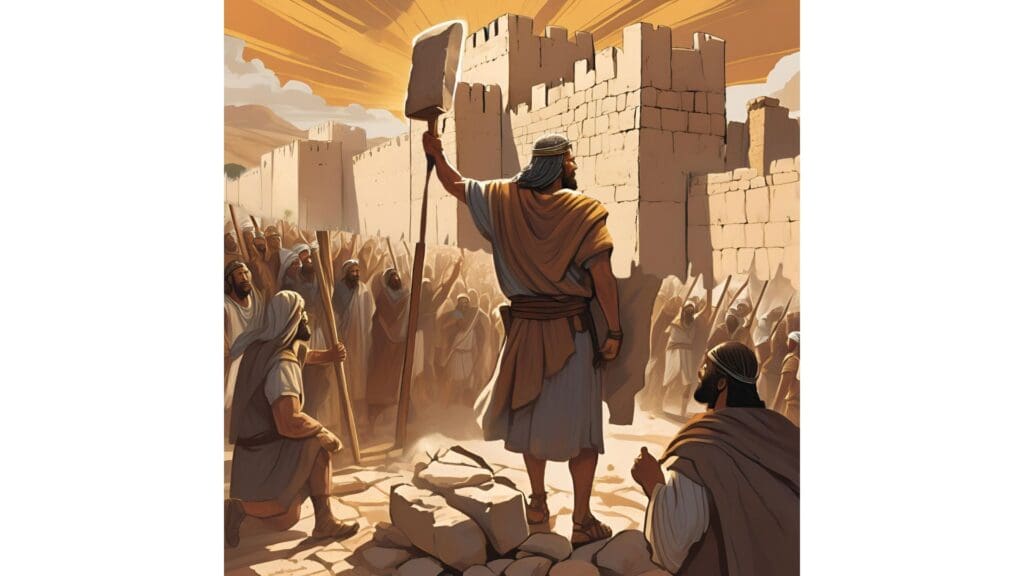How God Used Government in the Time of Nehemiah to Build the Wall
The story of Nehemiah and the rebuilding of Jerusalem’s walls is a powerful testament to how God can use government and leadership to achieve His purposes. Nehemiah, a cupbearer to the Persian king Artaxerxes, was deeply moved by the plight of his people and the dilapidated state of Jerusalem. Through his faith, leadership, and the support of the Persian government, Nehemiah was able to accomplish what seemed impossible.
Nehemiah’s Mission and Government Support
Nehemiah’s journey began with a heartfelt prayer and a bold request to King Artaxerxes. Nehemiah asked for permission to return to Jerusalem to rebuild its walls, a request that could have been seen as politically sensitive. However, God moved the heart of the king, who not only granted Nehemiah’s request but also provided him with letters of safe passage and resources for the construction (Nehemiah 2:7-8). This support from the Persian government was crucial for the success of the project.
Nehemiah’s leadership was marked by strategic planning and mobilization of the people. He assigned different sections of the wall to various groups, including families, craftsmen, and residents of nearby towns (Nehemiah 3:1-32). This collaborative effort ensured that the work was completed efficiently and in record time—just 52 days (Nehemiah 6:15).

Overcoming Opposition and Challenges
The rebuilding of the wall was not without its challenges. Nehemiah and the workers faced opposition from surrounding nations, including ridicule, threats, and attempts to sabotage the work (Nehemiah 4:1-3, 7-8). Despite these obstacles, Nehemiah’s faith and determination inspired the people to persevere. He implemented security measures, such as posting guards and having workers carry weapons while they built (Nehemiah 4:16-18). This combination of prayer, practical action, and governmental support enabled the successful completion of the wall.
Modern Examples of Government-Led Initiatives
Just as God used the Persian government to support Nehemiah’s mission, modern governments have played pivotal roles in transformative projects that have improved societies. Here are a few examples:
The Marshall Plan: After World War II, Europe was in ruins, much like Jerusalem in Nehemiah’s time. The United States government implemented the Marshall Plan, providing over $12 billion (equivalent to about $130 billion today) in economic assistance to help rebuild European economies. This initiative not only restored infrastructure but also fostered political stability and economic growth.
The New Deal: During the Great Depression, the U.S. government, under President Franklin D. Roosevelt, launched the New Deal. This series of programs, public work projects, and financial reforms aimed to provide relief, recovery, and reform to a nation in crisis. Projects like the construction of the Hoover Dam and the establishment of Social Security had long-lasting impacts on American society.
The Green Revolution: In the mid-20th century, many developing countries faced severe food shortages. Governments, with support from international organizations, implemented the Green Revolution, introducing high-yield crop varieties, modern agricultural techniques, and infrastructure improvements. This initiative significantly increased food production and alleviated hunger in many parts of the world.
Lessons from Nehemiah for Modern Governance
The story of Nehemiah offers several lessons for modern governance and leadership:
Vision and Prayer: Nehemiah’s mission began with a clear vision and fervent prayer. Modern leaders can draw inspiration from this by seeking divine guidance and having a clear, purpose-driven vision for their initiatives.
Government Support: Just as Nehemiah received support from King Artaxerxes, modern projects often require governmental backing to succeed. This support can come in the form of funding, policy changes, or logistical assistance.
Community Involvement: Nehemiah’s strategy of involving the community in the rebuilding process was key to its success. Modern initiatives can benefit from engaging local communities, ensuring that projects meet their needs and have their support.
Resilience and Adaptability: Nehemiah’s ability to adapt to challenges and maintain resilience in the face of opposition is a valuable lesson for modern leaders. Flexibility and determination are crucial for overcoming obstacles and achieving goals.
Security and Protection: Nehemiah’s measures to protect the workers highlight the importance of security in any project. Modern governments must ensure the safety and well-being of those involved in large-scale initiatives.
Conclusion
The story of Nehemiah and the rebuilding of Jerusalem’s walls is a timeless example of how God can use government and leadership to accomplish His purposes. By drawing parallels to modern examples, we see that the principles of vision, support, community involvement, resilience, and security remain relevant today. Whether in ancient Jerusalem or the modern world, God’s hand can be seen in the efforts of governments to make the world a better place.

